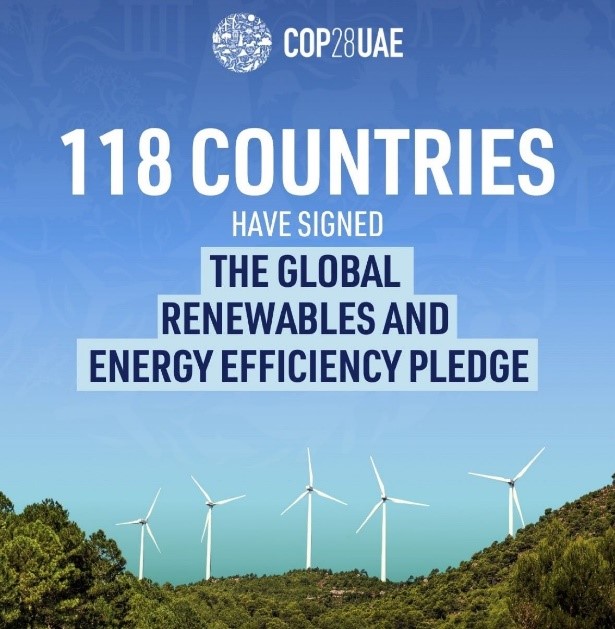Description

Disclaimer: Copyright infringement not intended.
Context
- 118 countries signed a renewable energy pledge at the ongoing COP28 climate summit to triple the world’s green energy capacity to 11,000 GW by 2030, thereby, reducing the reliance on fossil fuels in generating energy.
Highlights of “Global Renewables and Energy Efficiency Pledge”
- According to the “Global Renewables and Energy Efficiency Pledge”, countries have to “double the global average annual rate of energy efficiency improvements from around 2% to over 4% every year until 2030”.
- By checking the rise in emissions, governments hope to curtail global average temperature below the 2 degree Celsius temperature limit since pre-industrial times, if not the ambitious 1.5 degree Celsius of the 2015 Paris Agreement.
- The pledge is neither legally binding nor a part of the official COP28 calendar.
- COP28 also has the issue of tripling renewable energy on its agenda, the outcome of which is being keenly awaited. What the pledge does is indicate that world leaders want to be more active in checking global emissions.
- Solar, wind, hydropower and biofuels are seen as the fuels of the future, even in developing countries. According to the pledge, the tripling of renewable energy is expected to practically eliminate fossil fuels as energy sources by 2050.

India’s stand
- The pledge was spearheaded by the EU, the US and the UAE and supported by Brazil, Nigeria, Australia, Japan, Canada, Chile and Barbados.
- India and China have stayed away as the initiative calls for phasing down of coal and “ending the continued investment in unabated new coal-fired power plants”.
- In September 2023, however, India had already supported, as part of the G20, a commitment to work towards tripling global renewable energy capacity by 2030.
- The announcement was one of the strongest declarations to come out of the G20. All eyes are now on the result of discussions at COP28.
READ:
https://www.iasgyan.in/daily-current-affairs/cop28
https://www.iasgyan.in/daily-current-affairs/cop-28-triple-nuclear-capacity-by-2050
|
PRACTICE QUESTION
Q. India has rightly stayed away from the “Global Renewables and Energy Efficiency Pledge”. Justify.
|











